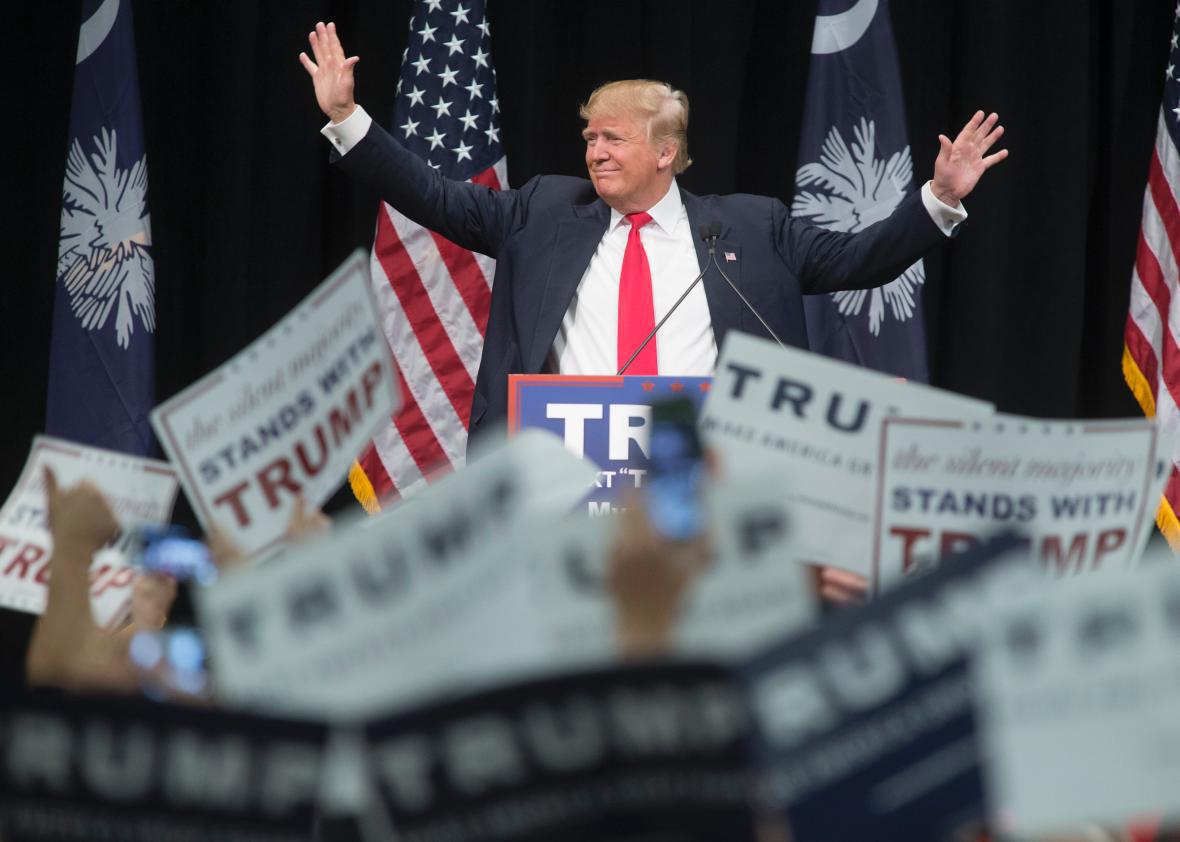Has anybody at the New York Times actually been listening to Donald Trump? I realize the man can be a bit garbled and vague, but it doesn’t take some esoteric reading of his public statements to realize that the Republican front-runner has, fundamentally, been campaigning as a Republican.
And yet the paper of record gives us this bizarre article—“Republican Race Puts Donald Trump and Paul Ryan on Collision Course”—which would have us think that Trump has been campaigning against the entire conservative agenda. Its thesis:
Panicked Republicans question whether Mr. Trump will be able to unite a Republican-controlled Congress that would normally be expected to promote and promulgate his agenda, an internal crisis nearly unheard-of in a generation of American politics. On nearly every significant issue, Mr. Trump stands in opposition to Republican orthodoxy and his party’s policy prescriptions—the very ideas that Mr. Ryan has done more than anyone else to form, refine or promote over the last decade.
This is prima facie false. Trump has campaigned primarily on the idea that politicians in Washington are idiots and that only he, the Donald, possesses the cunning and brass necessary to Make America Great Again. He has taken some important stances against the elite GOP consensus—particularly regarding trade, prescription drugs, and entitlement spending—but not so many that there’s any reason to think, beyond intuition, that he would shutter all or most of the party’s plans. Yes, the Times correctly notes that some Republican politicians, such as terminally morose South Carolina Sen. Lindsey Graham, have tried to claim that Trump is not one of them. But that’s no more than a limp campaign jab. And yes, some conservative pundits are worried that Trump doesn’t truly share their philosophical convictions and that he’d abandon them in favor of “free-floating populism with strong-man overtones,” as National Review’s editors put it. But at this point, that’s entirely hypothetical. So far, Trump isn’t standing against much of anything.
Don’t believe me? Let’s review.
Taxes
Donald Trump has proposed a massive, regressive tax cut that both Grover Norquist and CNBC supply-side talking head Larry Kudlow have heartily approved.
Health Care
Yes, Trump appeared to sort of haphazardly back Obamacare’s individual mandate earlier this month. But the man has since clarified that he’d fully repeal the Affordable Care Act and replace it with something that looks essentially like the generic Republican template for health reform, which mostly involves letting Americans buy cheap, less-than-comprehensive insurance across state lines.
Immigration
It is true that Trump has demagogued on immigration in a way unlike any viable Republican presidential candidate before. The man doesn’t do dog whistles. But whatever Paul Ryan’s personal views on the matter might be these days, congressional conservatives were already basically in the build-a-wall-and-deport-them-all camp that Trump now leads. Not surprisingly, Alabama Sen. Jeff Sessions (who has long spoken for the non-donor-class GOP consensus on immigration), loves Trump’s plan. And in the meantime, Marco Rubio has been driven so far to the right on this issue that he’s now talking about deporting Dreamers.
Global Warming
Donald Trump does not appear to believe in global warming.
Gun Control
Whatever his old views once were, Donald Trump now says he loves, loves, loves guns and the Second Amendment.
Trade
Trump is obviously not a Chamber of Commerce free trader, and he talks about slapping tariffs on Chinese- and Mexican-manufactured goods. That said, his written action plan on China is more or less the same as Mitt Romney’s.
Foreign Policy and the Military
Donald “the Most Militaristic Person You Will Ever Meet” Trump seems to have more isolationist instincts than your typical bellicose Republican—he certainly doesn’t share the neoconservatives’ passion for spreading democracy through regime change and sounds happy tolerating friendly (or somewhat friendly) dictators in the name of stability. He also talks about how the Iraq war was a mistake. On the other hand, he apparently counts on Rudy Giuliani for counsel and likes former United Nations Ambassador John Bolton, who thinks we should be bombing Iran. So who really knows?
What’s most amazing about the Times piece is that it manages to acknowledge many of these same points, while still somehow concluding that on “nearly every significant issue, Mr. Trump stands in opposition to Republican orthodoxy and his party’s policy prescriptions.”
To be clear, Trump has taken some important heterodox stands that could clash with the Republican leadership on Capitol Hill. Should he continue opposing cuts to Social Security and Medicare, for instance, it would be difficult for a Republican Congress to simply pass an off-the-shelf version of Ryan’s austerity budget. That would indeed be a very big deal.1
But the idea that Trump’s stated policy preferences are wildly at odds with the mainstream GOP’s, or even its donors’, is a fiction. The somewhat popular idea that Trump will transmogrify into a moderate populist in the mold of Arnold Schwarzenegger once he realizes how unpopular elite Republican policy positions truly are is nothing but speculation. For now, when it comes to the big-picture goals of slashing taxes for the wealthy, junking the Affordable Care Act, standing pat while the planet fries, and preventing the naturalization of undocumented immigrants while building a wall to keep more out, Donald Trump’s positions are perfectly in keeping with the Republican orthodoxy.
1 Personally, I wouldn’t be surprised if Trump’s complete lack of policy expertise ended up making him malleable on this front, especially if he really is already taking advice from old-time GOP economic hacks like Arthur Laffer and Stephen Moore.
